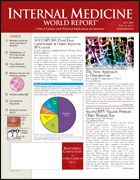Publication
Article
Internal Medicine World Report
Controversies in Lung Cancer: Can CT Screening Save Lives?
Author(s):
By Daniel M. Keller, PhD
Edward
Patz, Jr, MD
(Courtesy of Duke
University Medical
Center)
Radiology
Experts continue to debate whether repeated screening for lung cancer using computed tomography (CT), which detects more lesions earlier, can actually save lives. The newest results from the most recent New York Early Lung Cancer Action Project (NY-ELCAP) were recently published (. 2007;243:239-249), showing that repeat screening identified patients with early lesions.
JAMA
IMWR
The investigators insist they have demonstrated the benefit of repeat CT in improving outcomes, which contradicts an earlier article (. 2007; 297:953-961), which showed there was no mortality benefit with CT scanning despite early detection (see , April 2007).
Claudia Henschke, MD, PhD, professor of radiology at Weill Medical College of Cornell University, New York City, says the efficacy of a screening program depends on repeat annual screenings. "Once you stop screening, you no longer have the benefit of the screening...and certainly you might develop a cancer anytime thereafter," she warned.
In contrast, Edward Patz, Jr, MD, professor of radiology, pharmacology, and cancer biology at Duke University Medical Center, Durham, NC, says the NY-ELCAP study "has absolutely no mortality statistics in it. So itfs actuallyc presenting no real new information over anything else that theyfve published."
Several ELCAP studies have been published from the different centers. In this new study, asymptomatic patients (n = 6295; aged ≥60 years) who had smoked for ≥10 pack-years (median, 40 years) and had no previous cancer were screened at baseline and once annually with low-dose CT.
Further workup was recommended in 14.4% of the patients screened at baseline (n = 6295) and in 6% of those presenting for the 1 annual screening thereafter (n = 6014). In the 101 patients diagnosed with lung cancer based on baseline screening, as well as the 3 cases prompted by symptoms before the annual screening, 91.3% had no clinical evidence of metastases. Of the 20 patients diagnosed after the annual screening, 85% showed no evidence of metastases.
IMWR
Dr Henschke tells that these findings confirm that "a high proportion of [tumors] are in stage I," but about one third of patients delayed further workup or treatment, with some tumors progressing in stage.
According to Dr Patz, all the ELCAP studies suffer from a lack of a control group and a lack of published data for determining mortality outcomes.
None of the ELCAP studies reported hard numbers for mortality, only estimates. The NY-ELCAP study referred back to estimated 10-year survival rates in the International ELCAP (published last year) of 80% for all lung tumors detected and 92% for stage I cancers that were promptly resected. The American Cancer Society reports a 5- year survival rate of 16% for all stages of lung cancer and 49% for resected localized disease.
It is possible that screening will detect tumors earlier, without any influence on mortality. The critical measure of outcome for screening is long-term mortality among the entire screened population, not survival time of diagnosed cases, Dr Henschke agrees.
For now, Dr Patz recommends against widespread use of CT screening for lung cancer. "There are no data to suggest that it works or doesn't work," he said, "and I don't see any reason that we go out and advocate a technology that may introduce a lot of problems. We don't understand all the risks and benefits right now."
He said he thinks the National Lung Screening Trial (NLST) and the NELSON (Nederlands-Leuvens Longkanker Screenings Onderzoek) trial in Europe should add useful information. Whether they will give definitive answers is an open question.
Dr Henschke disagrees, saying CT screening is useful for patients at risk for lung cancer, if it is done systematically, according to a strict protocol in a controlled setting with trained operators, quality assurance, and good follow-up.
She recommends that this technology should not be denied to people in the United States, while awaiting the results of the NLST. She also emphasizes that smoking cessation advice and programs should be built into any screening programs.
Dr Patz says CT screening for lung cancer is still "a very confusing topic." He tells physicians that screening is not ready for general clinical practice. The complete benefits and risks are not known, for example, what to do about abnormal nodules that may need follow-up using invasive procedures. He also says that the risk of additional radiation "is not trivial, and I don't think that we should minimize that."





